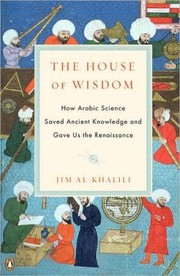Check nearby libraries
Buy this book

"A myth-shattering view of the medieval Islamic world's myriad scientific innovations, which preceded-and enabled-the European Renaissance. The Arabic legacy of science and philosophy has long been hidden from the West. British-Iraqi physicist Jim Al-Khalili unveils that legacy to fascinating effect by returning to its roots in the hubs of Arab innovation that would advance science and jump-start the European Renaissance. Inspired by the Koranic injunction to study closely all of God's works, rulers throughout the Islamic world funded armies of scholars who gathered and translated Persian, Sanskrit, and Greek texts. From the ninth through the fourteenth centuries, these scholars built upon those foundations a scientific revolution that bridged the one-thousand-year gap between the ancient Greeks and the European Renaissance. Many of the innovations that we think of as hallmarks of Western science were actually the result of Arab ingenuity: Astronomers laid the foundations for the heliocentric model of the solar system long before Copernicus; physicians accurately described blood circulation and the inner workings of the eye ages before Europeans solved those mysteries; physicists made discoveries that laid the foundation for Newton's theories of optics. But the most significant legacy of Middle Eastern science was its evidence-based approach-the lack of which kept Europeans in the dark throughout the Dark Ages. The father of this experimental approach to science-what we call the scientific method-was an Iraqi physicist who applied it centuries before Europeans first dabbled in it. Al-Khalili details not only how discoveries like these were made, but also how they changed European minds and how they were ultimately obscured by later Western versions of the same principles. With transporting detail, Al-Khalili places the reader in the intellectual and cultural hothouses of the Arab Enlightenment: the House of Wisdom in Baghdad, one of the world's greatest academies, the holy city of Isfahan, the melting pots of Damascus and Cairo, and the embattled Islamic outposts of Spain. Al-Khalili tackles two tantalizing questions: Why did the Arab world enter its own Dark Age after such a dazzling enlightenment? And how much did Arabic learning contribute to making the Western world as we know it? Given his singular combination of expertise in both the Western and Middle Eastern scientific traditions, Al-Khalili is uniquely qualified to solve those riddles"--Provided by publisher.
Check nearby libraries
Buy this book

Previews available in: English
Subjects
Methodology, Renaissance Science, Intellectual life, Science, Philosophy, Medieval Science, History, Religion and science, HISTORY, Influence, General, Renaissance, Wissenschaft, World, Araber, Islam, Islam and science, New York Times reviewed, Science, philosophy, Science, arab countries, Science, medieval, Science, methodologyPlaces
Arab countries| Edition | Availability |
|---|---|
|
1
The House of Wisdom: How Arabic Science Saved Ancient Knowledge and Gave Us the Renaissance
2012, Penguin Press, Penguin Books
Paperback
in English
- 1st American ed.
0143120565 9780143120568
|
aaaa
|
Book Details
Table of Contents
Edition Notes
Includes bibliographical references and index.
Classifications
External Links
The Physical Object
ID Numbers
Source records
Library of Congress MARC recordmarc_openlibraries_sanfranciscopubliclibrary MARC record
amazon.com record
marc_claremont_school_theology MARC record
Library of Congress MARC record
Internet Archive item record
marc_claremont_school_theology MARC record
Better World Books record
marc_nuls MARC record
Work Description
A myth-shattering view of the Islamic world's myriad scientific innovations and the role they played in sparking the European Renaissance.
Many of the innovations that we think of as hallmarks of Western science had their roots in the Arab world of the middle ages, a period when much of Western Christendom lay in intellectual darkness. Jim al- Khalili, a leading British-Iraqi physicist, resurrects this lost chapter of history, and given current East-West tensions, his book could not be timelier. With transporting detail, al-Khalili places readers in the hothouses of the Arabic Enlightenment, shows how they led to Europe's cultural awakening, and poses the question: Why did the Islamic world enter its own dark age after such a dazzling flowering?
Links outside Open Library
Community Reviews (0)
History
- Created July 29, 2011
- 14 revisions
Wikipedia citation
×CloseCopy and paste this code into your Wikipedia page. Need help?
| March 7, 2023 | Edited by MARC Bot | import existing book |
| December 30, 2021 | Edited by ImportBot | import existing book |
| July 27, 2021 | Edited by ISBNbot2 | normalize ISBN |
| March 3, 2021 | Edited by MARC Bot | import existing book |
| July 29, 2011 | Created by LC Bot | Imported from Library of Congress MARC record |










